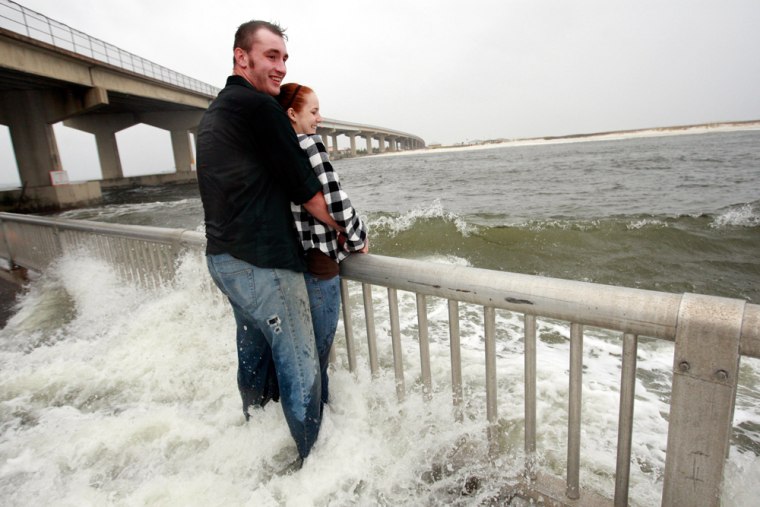Squalls ahead of a rare late-season tropical storm blew in heavy rain to parts of the Gulf Coast where residents hunkered down at home and in shelters anticipating high winds and flooding.
Ida had slowed as it approached the coast late Monday. It was about 100 miles south-southwest of Mobile and expected to make land early Tuesday before turning east. Tropical storm warnings were out across Louisiana, Mississippi, Alabama and Florida, where governors declared states of emergency.
In Gulf Shores along the coast, some streets were flooded and the city was under a 10 p.m. curfew.
A low-pressure system that Hurricane Ida may have played a role in attracting earlier triggered flooding and landslides in El Salvador that killed at least 130 people. Near New Orleans, a 70-year-old man was feared drowned Monday when trying to help two fishermen whose boat had broken down in the Mississippi River, said Maj. John Marie, a Plaquemines Parish Sheriff's spokesman. A wave knocked him into the water.
Expected to weaken more
Ida had been the third hurricane of this year's Atlantic season, which ends Dec. 1, but weakened with maximum sustained winds near 65 mph. Its speed had slowed to 13 mph and was moving north.
The storm was expected to weaken further before making landfall. Rain will move well inland before it does come ashore, said U.S. National Hurricane Center hurricane specialist Robbie Berg. Rainfall could be up to 8 inches in some areas, with most of the coast getting between 3 and 6 inches.
The streets were quiet in downtown Mobile, about 40 miles northwest of Gulf Shores, as many of the stores and restaurants had closed early. Stiff winds with gusts up to 50 mph and sheets of rain made driving hazardous, and many residents opted to stay off the roads, although few said they were leaving town.
Doris Moorman, who was managing the Red Cross shelter in Pascagoula, Mississippi, said she staffed a similar shelter last year during Hurricane Gustav that housed more than 500 people. She said she's concerned residents weren't taking the threat seriously, perhaps letting their Gustav experience lull them into a false sense of security.
"That doesn't necessarily mean it's going to be fine this time," she said.
Earlier, some residents did reflect that attitude.
"We can ride it out right here," said T.J. Covacevich, 50, who wore a "Hurricane Hunter" T-shirt as he tied down his powerboat in a Biloxi, Mississippi, harbor.
Forecasters predicted Ida's storm surge could raise water levels 3 to 5 feet above normal. In Pensacola, Florida, the streets were empty as heavy rain fell. The Gulf was rough and building and winds were howling.
Residents elsewhere in the Southeast braced for heavy rain. In north Georgia, which saw historic flooding in September, forecasters said up to 4 more inches could soak the already-saturated ground.
Workers rescued from oil rig
Two Chevron Corp. workers weren't injured but had to be rescued from an oil rig about 80 miles south of New Orleans that was in danger of toppling as Ida churned up high seas.
There were no mandatory evacuations, but authorities in coastal areas encouraged people near the water or in mobile homes to seek shelter. Many schools closed, and several cruise ships were delayed as the U.S. Coast Guard closed Gulf Coast ports.
In Louisiana and Mississippi, officials were concerned about hundreds of people still living in federally issued trailers and mobile homes after hurricanes Katrina and Rita in 2005.
Fred Everhardt, a councilman in southeast Louisiana's St. Bernard Parish, was frustrated as he counted camper-trailers he worried would get loose and clog bayous or ram into homes elevated and rebuilt after Katrina. He said he feared people were not taking the storm as seriously as they should.
